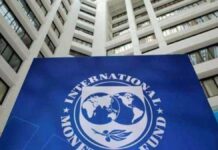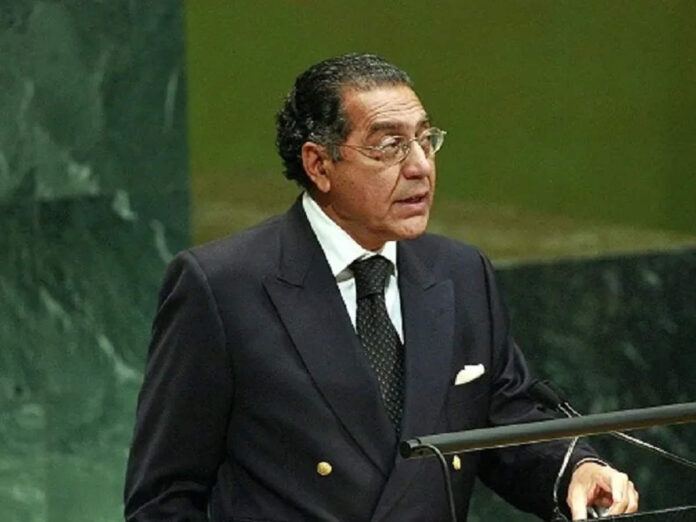ISLAMABAD: In an action plan laid out before the United Nations Security Council (UNSC), Pakistan called for the proscribing of hyper-nationalist groups including Rashtriya Swayamsevak Sangh (RSS) — the parent body of India’s hardline ruling Bharatiya Janata Party (BJP) — posing “a clear […] danger to regional and international peace and security”.
Addressing the 15-member Security Council on Tuesday, Islamabad’s permanent ambassador to the UN Munir Akram suggested to outlaw “violent extremist supremacist groups” like other terrorist outfits.
“Such violent racist and extremist terrorism will inevitably breed counter-violence and validate the dystopian narrative of terrorist organisations such as ISIS/Daesh and Al-Qaeda,” Akram said.
Referring to Hindutva, the ideology of militant Hindu nationalism, followed by Indian prime minister Narendra Modi and his BJP, Akram warned the hardline idealogy threatened India’s 200-million strong Muslim population.
Akram further called for immediate steps to curb the rise of violent nationalism, proposing the following measures: calling on states to designate acts of violent nationalist groups, including white supremacists and other racially and ethnically motivated groups, as terrorism, just as the world has done in case of Al-Qaeda/ISIS and their affiliated groups.
He also suggested initiating immediate domestic actions to prevent the propagation of their violent ideologies, recruitment to and financing of these groups in addition to requesting the secretary general, António Guterres, to present a plan of action to confront and defeat nationalist groups’ extremist ideologies and actions.
The proposal also called for the expansion of the mandate of the 1267 Sanctions Committee to include nationalist terrorist groups like the RSS.
Akram also called upon the body to “address certain neglected manifestations of terrorism, one of which is the phenomenon of ‘state terrorism’”, citing the situation in occupied Kashmir where Indian forces “are perpetrating war crimes, crimes against humanity, and against the occupied peoples in order to terrorise them into submission”.
As new threats to global peace and security arise, Akram said, the world needs to expand and adjust its counter-terror strategy to “defeat terrorism in all forms and manifestations”.
Seperately, in a series of tweets, Akram expressed concerns that these “violent nationalists’ groups are growing stronger & more popular attempting to mainstream right-wing ideologies”.
“In India,” he said, “such neo-fascist groups now rule the country” and noted that the “violent extremist Hindutva ideology poses an existential threat to the 180 [million] Indian Muslims [and] a danger to regional & [international] peace & security.”
In India, such neo-fascist groups now rule the country. Violent extremist Hindutva ideology poses an existential threat to the 180 M Indian Muslims
& a danger to regional & int’l peace & security. They must be outlawed by the Security Council like other terrorist groups.2/2— Pakistan Permanent Representative to UN (@PakistanPR_UN) January 12, 2021
“They must be outlawed by the Security Council like other terrorist groups,” Akram said.
This is not the first time Pakistan has highlighted the threat posed by nationalist groups, particularly the BJP and RSS. Prime Minister Imran Khan has repeatedly urged the world to take note of BJP’s “racist” ideology, which, according to the premier, is inspired by German Nazism.
The Pakistan Tehreek-e-Insaf (PTI) government has highlighted the Indian government’s moves that critics say discriminate against minorities, especially Muslims.
In its years in power, the BJP government stripped occupied Kashmir of its special status, a move that ignited a diplomatic rift between arch-rivals India and Pakistan.
The abrogation of Article 370 of the Constitution followed a strict clampdown that confined residents to their homes for months. Residents of the valley, as well as critics, believe the move is an attempt to dilute the demographics of the Muslim-majority region with Hindu settlers.
Prime Minister Narendra’s administration also introduced the contentious Citizenship (Amendment) Act, which grants citizenship to non-Muslims who migrated to India from neighbouring countries.
The passage of the law — which critics say is discriminatory against Muslims — followed the first National Register of Citizens (NRC), published in August 2019, which left almost two million people — mostly Muslims — stateless. Most of those who were left out of the register had migrated from East Pakistan (now Bangladesh) in 1971.

























